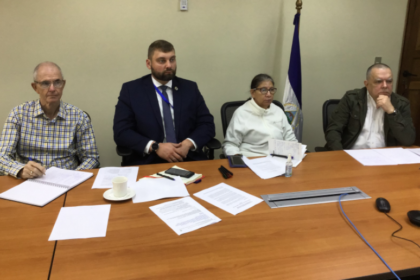
Stanislav Uiba, General Director of the Russian-Nicaraguan Instituto MECHNIKOV (Nicaragua) took part in the online conference “Health System, Vaccines And Biotechnology Laboratories In Latin America”.
The agenda included the transformation of reality, globalization of solidarity and public health after the emergencies and crisis caused by COVID-19. The participants shared opinions on the significance of cooperation between the communities, enterprises, scientists and governments in achieving this goal.
The meeting was attended by: Monsignor Vincenzo Paglia, President of the Pontifical Academy of Life Sciences, Monsignor Bruno-Marie Duffé, Secretary of the Vatican's Dicastery for Integral Human Development, Dr. Maximiliano Reyes, Deputy Minister of Foreign Affairs of Mexico, Monsignor Juan Carlos Cárdenas, General Secretary of the Episcopal Conference of Latin America, a few virology experts such as Dr. Manon M.J. Cox, Dr. Gianni Tognoni and Dr. Daniel Adams, and representatives from Latin American laboratories and health institutes. Dr. Roberto López, Executive President of the Institute of Social Security INSS (Nicaragua) and Dr. Sagrario Benavides, Vice President of INSS, also joined the Seminar.
The panelists suggested that despite the current situation of research and development of a COVID-19 vaccine, the Latin American states may choose options that could set a course for improving the health and well-being of their nations. One option is to pursue the policy of economic and cultural subordination, follow the traditional patterns of globalization. Another option is to use the vaccine development as a stepping stone towards transformation capable of protecting public health and reinforcing the Latin American economies and technological systems.
Representatives of the Roman Catholic Church, Monsignor Vincenzo Paglia and Monsignor Bruno-Marie Duffé, suggested that safety and health are essential to well-being: “We should take this opportunity to view health as a benefit and condition for development, not as a production tool. Healthcare needs to be revised from the global perspective: protecting people, the planet and relationships between communities.”
In his speech, Dr. Roberto López noted that the global pharmaceutical delivery system is currently focused on making profits. Families and nations have to pay inflated prices for medications. This pandemic has revealed an excessive trend of profiteering on the medications. States play a key role in finding alternatives for the production of medications, ensuring affordable prices and thus making medications accessible to the population. “In Nicaragua, we look forward to cooperation with the Russian Federation within the framework of the Instituto MECHNIKOV project, where we have the opportunity to produce 50 million doses of influenza vaccine per year, which opens up prospects for cooperation with other countries.” He added that countries should promote pharmaceutical policies ensuring that medications are a common good rather than just a vaccine. “As far as Nicaragua is concerned, we have succeeded thanks to the joint state-owned enterprise such as the Instituto MECHNIKOV.”
Eventually, the panelists came to the conclusion that rather than a problem, COVID-19 should be considered as an opportunity to raise health to the level of public, political and economic good, and make it a common goal of society and the church. The vaccine is vital, while poor coordination between the regions and all the parties involved is fraught with serious problems.